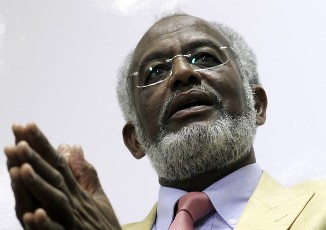Sudan sees little hope for peaceful end to Syrian crisis
February 10, 2012 (KHARTOUM) – Sudan’s foreign minister, Ali Karti, has expressed doom and gloom over the situation in Syria, indicating that the chances of reaching a peaceful settlement to the crisis are now slimmer than ever.

Sudan’s top diplomat said that the current situation in Syria was “miserable” and “bodes no good” as Al-Assad regime continues to escalate violent crackdown against protesters demanding his ousting.
Surprisingly, Karti criticised the Russian and Chinese veto, saying it has allowed the Syrian government to wriggle out of its obligations under the Arab League’s plan aimed at salvaging the situation.
He further expected that the already bad situation could worsen to reach unprecedented levels, expressing despair that the situation could improve.
Karti denied press reports that the Sudanese presidential adviser, Mustafa Osman Isma’il, attempted to mediate between the Syrian government and opposition, saying that he visited Damascus to participate in a political event.
Sudan Tribune last month revealed that Isma’il held a secret meeting with Al-Assad in Damascus and discussed the situation in the country as well as the work of the Arab League’s observers.
The Sudanese minister revealed that he held a meeting with a representative of the Syrian opposition who arrived in Khartoum last week. Karti said that the meeting made him realise that both sides of the Syrian crisis have no intention to cease military operations. He also said that the Syrian opposition expressed dissatisfaction with the role and operation of the Arab League’s observer mission.
The Arab League’s observation mission to Syria was led by Mohamed Ahmed Al-Dabi, a Sudanese general closely linked to the ruling Sudanese regime of President Omer Al-Bashir.
Al-Dabi, whose appointment to the position faced a barrage of criticism due to his association with the Sudanese government, drew the ire of Syrian opposition and many across the Arab World when he said in his report to the Arab League that the level of violence in Syria has receded following the arrival of the observers.
Sudan initially called the events in Syria “an international conspiracy” but later had a change of heart and backed an Arab League’s resolution suspending Syria’s membership and introducing economic sanctions against Al-Assad’s regime.
The UN says more than 5,000 civilians have been killed by security forces and 14,000 others detained since the unrest started in March 2011. The Syrian government says 2,000 members of its security forces have died.
Sudan will not raise Halayib issue with Egypt at the moment
In another context, Karti said in his interview that Sudan does not wish to broach the issue of Halayib with Egypt at the moment.
Halayib is a disputed territory situated on Sudan’s north east border with Egypt. The dispute over the area has resulted from a discrepancy in the demarcation of political boundaries set by the Anglo-Egyptian Condominium and the ones set earlier by the British in 1902.
The area was seized by the Egyptian army in mid 1990 after relations between Khartoum and Cairo plummeted against the backdrop of a failed attempt to assassinate former Egyptian president Hosni Mubarak.
According to Karti, it would be “unethical” of Khartoum to bring this issue up with Cairo at this “inopportune” moment. He explained that Sudan believes that Egypt is still in limbo and needs stability despite the fact that it has been more than one year since Mubarak regime was ousted.
Karti said that Khartoum intends to approach Halayib issue in a positive and peaceful manner, pointing out that this mean that Halayib could become an area of integration between the neighbouring countries.
(ST)
